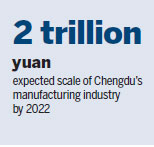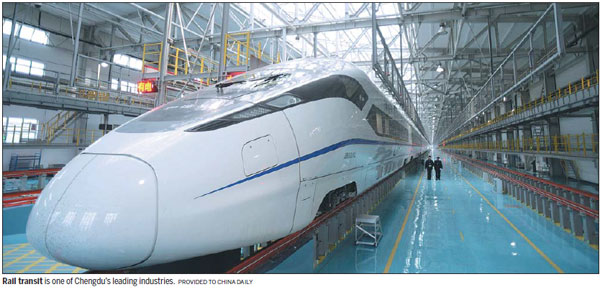Sichuan megacity to undergo industrial overhaul in coming years
Chengdu, capital of Southwest China's Sichuan province, is ready to increase the scale of its manufacturing industry to 2 trillion yuan ($294 billion) by 2022, according to an official report.
Chengdu will strengthen financial support for its industrial development by setting up a fund as large as 100 billion yuan, so as to guide investors and social capital.
Earlier this month, the city released the plan to establish itself as a national hub city, saying advanced manufacturing would contribute more than half of the city's industrial sector.
Electronic information is a key sector among the city's advanced manufacturing. Its main business revenue was expected to reach 1.2 trillion yuan by 2022 with annual growth of about 16 percent, including fields of circuitry, new-type display, information safety, software, intelligent terminals, network communication, applied electronics and the internet of things.

An international automobile center will also be established to produce new energy, light and intelligent cars.
Its strength in aerospace, rail transit, energy conservation and environmental protection, new materials and new energy will drive future economic growth, according to local officials.
The city is also eyeing cutting-edge industries including artificial intelligence, virtual reality, sensory control and additive manufacturing, in order to improve its competitiveness in the global market by marching into a mid-to-high-end era.
In the modern finance industry, functions of the asset market, wealth management, accounting, ventures' financing and new finance will be enhanced, the report said.
Local officials said they expect the added value of the financial industry to exceed 250 billion yuan by 2022, accounting for 12 percent of the city's GDP.
The local government encouraged financial institutions to set up branches, settlement centers and asset management centers in the city to gather more capital.
By 2020, the direct financing rate of enterprises is expected to reach more than 60 percent.
To boost technological functions in western China, the city has planned to develop high-tech service industries by supporting the co-construction of technologically innovative alliances and industrial associations between universities and other organizations.
The city's authorities aim to introduce 10 e-commerce enterprises this year and 50 by 2022.
A modern agricultural demonstration zone will be constructed with an optimized production, operation and industrial system.
Local officials said they expect the city's total production of agriculture to surpass 89.9 billion yuan in 2017.
Agriculture will be linked with rural and luxury tourism, with an emphasis on countryside landscapes, folk customs and fashionable functions.

(China Daily 07/20/2017 page12)














